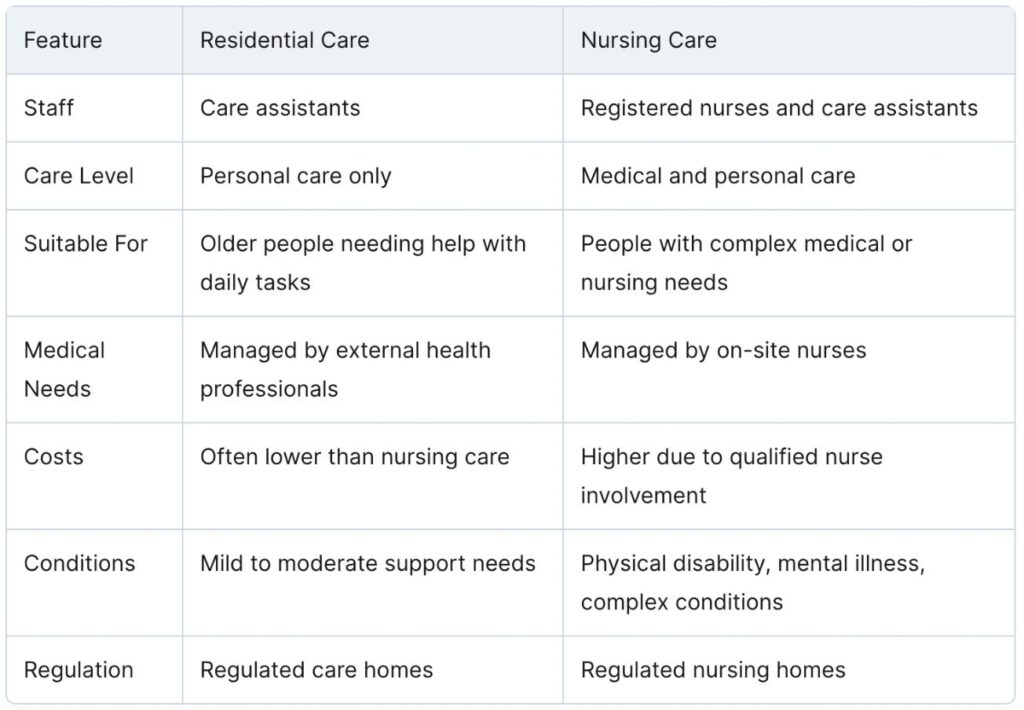Residential Care vs Nursing Care: Understanding the Differences

Choosing the right care for yourself or a loved one is a significant decision, and understanding the differences between residential care and nursing care is key to making an informed choice. Whether you’re exploring options due to age-related frailty, a complex medical condition, or mental health issues, knowing what each type of care provides will help you choose the most suitable care and support.
At Lammermuir House, we offer high-quality, person-centred care tailored to a variety of needs. In this blog, we’ll break down residential care vs nursing care, explain what each involves, and offer guidance on how to determine the best fit for your circumstances.
What is Residential Care?
Residential care is designed for individuals who may struggle with everyday living but do not require regular medical care. It is most suitable for people who need help with daily tasks such as washing, dressing, personal hygiene, eating, or taking medication.
In a residential care home, residents live in a safe and comfortable environment, usually in individual en suite bedrooms, and are supported by qualified care assistants. The focus is on offering personal care and support rather than medical treatment.
Services typically include:
- Assistance with personal care
- Help with mobility
- Nutritious meals
- Laundry and housekeeping
- Social and recreational activities
- Access to visiting health professionals
Residential care settings offer a homely atmosphere where residents engage with other residents in communal spaces, such as dining areas, lounges, and gardens. It’s ideal for those who may feel lonely or unsafe living alone but don’t have significant health complications.
What is Nursing Care?
In contrast, nursing care is suited to people who have nursing needs or a complex medical condition that requires ongoing attention from trained nurses. This type of care is typically provided in a nursing home, where qualified nurses on site are available 24 hours a day.
Nursing care is appropriate for individuals with:
- Severe physical disabilities
- Ongoing ill health
- Frequent medical treatment
- Post-operative recovery
- Mental illness or mental health issues
- Severe learning disabilities
- Advanced dementia care needs
In these settings, qualified nurses and medical professionals are responsible for:
- Administering medication
- Wound care and pressure sore management
- Monitoring chronic conditions
- Coordinating with visiting health professionals
- Providing specialist medical care
A nursing care component is essential for those who cannot be safely supported in a standard residential care setting. The presence of registered nurses ensures that individuals receive immediate medical attention when required.
Residential Care vs Nursing Care: Key Differences
Here’s a clear comparison to help you understand the differences between residential care and nursing care:

Understanding these differences is crucial when deciding on a care setting that best suits your or your loved one’s needs.
Specialist Dementia Care: Residential and Nursing Options
For individuals with dementia, care requirements can vary widely. In the early stages, residential care homes may offer sufficient support. However, as the condition progresses and more specialist knowledge and medical care is required, a specialist dementia nursing home becomes more appropriate.
At Lammermuir House, we provide both residential care and nursing options, with dedicated dementia care pathways that evolve as the individual’s needs change.
Staff in our dementia units are trained to identify symptoms, provide specialist care, and create safe and comfortable environments where residents engage in meaningful activities tailored to their capabilities.
Funding: Who Pays for What?
Another important consideration in the residential care vs nursing care decision is cost. Nursing home costs are typically higher due to the requirement for registered nurses and specialised equipment. However, financial help may be available.
Local Authority and NHS Funding:
- If a needs assessment confirms you require nursing care, you may qualify for NHS-funded nursing care. This covers the nursing care component but not accommodation or personal care.
- For both residential and nursing homes, your local council may provide financial support following a financial assessment.
Understanding your funding options can ease the burden on family members and help ensure the right level of care is affordable.
When to Consider Residential Care
Residential care may be the right choice if you or your loved one:
- Needs help with everyday living but not with medical procedures
- Struggles with personal hygiene or mobility
- Feels lonely or isolated at home
- Has mild dementia but no complex medical conditions
- Would benefit from social and physical activity in a communal setting
This type of care provides peace of mind while promoting independence and social engagement in a structured yet flexible environment.
When to Consider Nursing Care
Nursing care is typically needed when:
- There is a diagnosis of a complex medical condition
- The person requires frequent medical treatment
- There is ongoing ill health or recovery from surgery
- A person has severe physical disabilities or a learning disability
- They need support administering medication or specialist equipment
- Mental health issues or mental illness affect day-to-day living
The involvement of qualified nurses means care can be more intensive and immediately responsive to changing health conditions.
The Value of Combined Care Facilities
Some care homes, like Lammermuir House, offer both residential care and nursing under one roof. This flexibility allows residents to transition between care levels without having to move to a new facility—a great comfort to family members and residents alike.
In such settings:
- Residential care residents can move to nursing care if their health deteriorates.
- Care assistants work alongside qualified nurses to deliver holistic care.
- There is better coordination between personal and medical care.
- Relationships with staff and other residents can remain consistent.
This model ensures continuity and reduces stress for everyone involved.
Choosing Between Residential and Nursing Care
To determine which care type is right for you or your loved one, consider the following steps:
Arrange a Needs Assessment: Contact your local authority to assess whether nursing care or residential care is most appropriate.
Consult Medical Professionals: Speak with a GP or district nurse for expert medical advice.
Visit Care Homes: Seeing facilities in person will help you get a feel for the environment and ask specific questions.
Review Costs and Funding Options: Understand what’s covered by funded nursing care, and what you’ll need to contribute.
Involve Family Members: Making a joint decision ensures all voices are heard and needs considered.
A Safe and Supportive Environment for All
Whether you choose residential care, nursing care, or a facility that offers both, the most important goal is to ensure your loved one receives compassionate, dignified, and person-centred support.
At Lammermuir House, we are committed to providing a safe and comfortable environment where individuals can thrive, feel secure, and live with as much independence and joy as possible. Our team of qualified nurses, care assistants, and medical professionals work around the clock to deliver expert care with a personal touch.
Which is Right for You?
The difference between a care home and a nursing home can seem subtle at first—but the distinction becomes critical when considering nursing needs, medical conditions, and long-term care planning.
If your loved one needs help with daily tasks but is otherwise medically stable, residential care may be the best fit. But if they require specialist medical care, support with administering medication, or have a complex medical or mental health condition, nursing care will provide the level of assistance they need.
Understanding the differences in residential care vs nursing care empowers you to make the right decision for your family—and ensures your loved one is cared for with the dignity, compassion, and expertise they deserve.
If you're unsure which path to take, the team at Lammermuir House is here to help. Contact us to learn more about our care options, book a visit, or request a personal consultation. We’re here to guide you—every step of the way.






